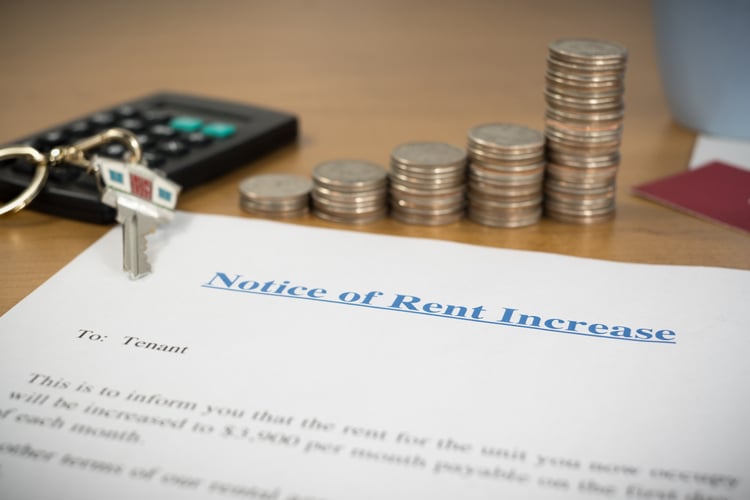As the owner of a self storage facility, it's crucial to stay well-informed about the laws governing rent increases. Understanding your legal responsibilities and the rights of your tenants can help you navigate the delicate balance between maintaining a profitable self storage business and providing fair service.
This includes being aware of any required notice periods, caps on percentage increases for storage units, and the potential impact on tenant relations. In the following blog, we will delve into the specifics of storage unit rent increase laws and practical considerations to ensure compliance and customer satisfaction.
Why Understanding Rent Increase Laws Matters
Storage unit rent increase laws are in place to protect both facility owners and tenants. For owners, these laws provide guidance on how much they can raise rents and when, helping owners and operators in the self storage industry maintain a healthy profit margin without overcharging customers.
On the other hand, for tenants, these laws offer a level of protection against sudden or unreasonable rent hikes that may negatively impact their budget or force them to seek alternative storage options. By understanding these laws, facility owners can maintain positive relationships with their tenants and avoid potential legal issues.
Factors to Consider When Increasing Rent at Self Storage Facilities

Statutory Notice Period
One of the most critical aspects of storage unit rent increase laws is the statutory notice period. This is the minimum amount of time that a tenant must be given before a rent increase takes effect.
The length of this notice period varies by state and can range from 15 to 90 days. It's essential to be aware of the specific time frame required in your state and ensure compliance to avoid any legal repercussions.

Limitations on Percentage Increases
In addition to the notice period, many states have implemented limitations on the percentage increase that a facility owner can impose. For example, some states may have a maximum increase of 5% while others may allow up to 10%. Others have a percentage or specified amount, like 10% or $10, whichever is greater. It's crucial to research and understand the limitations in your state to avoid overcharging tenants and potential legal issues.
Some states have price gouging laws that kick into effect in a State of Emergency. Make sure your state is not in a State of Emergency, typically enacted by a state governor, before you raise rents.
Considerations for Tenant Relations
While it's necessary to comply with storage unit rent increase laws, there are also various practical considerations that facility owners should keep in mind. For example, it's essential to communicate the rent increase clearly and provide sufficient reasoning behind the decision.
This can help tenants understand and accept the increase, preventing any potential conflicts or misunderstandings. Additionally, offering incentives such as discounts for long-term tenants who express a need to move out due to the increase or implementing gradual increases over time can also help maintain positive relationships with customers.

Ensuring Compliance at Your Storage Company
To ensure compliance with storage unit rent increase laws, facility owners should take proactive measures such as regularly reviewing state regulations and seeking legal advice if needed. It's also essential to keep accurate records of all communication with tenants, including any rent increase notices and their responses. By staying informed and organized, owners can avoid any potential conflicts or legal issues.
Federal Rent Increase Laws
In addition to state laws, there are also federal rent increase laws that may apply depending on the type of storage facility. For example, facilities located on federal property or those receiving government funding may be subject to additional regulations and restrictions. Owners must research and understand these federal laws to ensure full compliance.
State-Specific Rent Increase Laws
It's also important to note that rent increase laws may vary from state to state. For example, some states may require written notice while others may allow verbal notification. Research and understand the specific laws in your state to avoid any potential discrepancies.
The Process of Increasing Rent for Self Storage Units

- Draft a Clear Notice of Increase: Begin by creating a written notification, such as a storage unit rent increase letter, that clearly outlines the new rent amount, the reason for the increase, and when the new rate will take effect.
- Adhere to Statutory Notice Periods: Ensure the notice is given to the tenant within the time frame required by state law, which can range from 15 to 90 days before the increase.
- Calculate Fair Increase Rates: Stay within your state's legal limits for rent increases, usually a percentage of the current rent.
- Maintain Open Communication: Make yourself available to discuss any concerns or questions your tenants may have about the increase.
- Provide Justification: If possible, explain the reasoning behind the rent increase, such as rising costs of maintenance or improvements to the facility.
- Document Tenant Acknowledgment: Keep a record of the notice provided and any acknowledgment or responses received from your tenants.
- Offer Payment Options or Assistance: Consider offering multiple payment methods or a short-term assistance plan for tenants who may struggle with the transition.
- Evaluate Tenant Incentives: Look into providing incentives for prompt payment or long-term leases, which may soften the blow of an increase. For example, you could offer discounts for tenants who enroll in autopay.
- Review and Comply with Federal Laws: If applicable, make sure your increases are in line with any federal regulations that could apply to your facility.
- Update Rental Agreements: Reflect the new rent amount in your rental agreements or leases, ensuring that all new contracts are signed and dated.

Get Help from a Storelocal Consultant
For further guidance on navigating storage unit rent increase laws, consider reaching out to a Storelocal consultant. Our team of experts can provide personalized advice and support to ensure compliance with state and federal regulations, as well as offer strategies for maintaining positive tenant relationships. With our help, you can navigate the process of increasing rent smoothly and avoid any potential legal issues. Contact us today to get started.